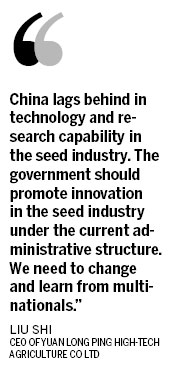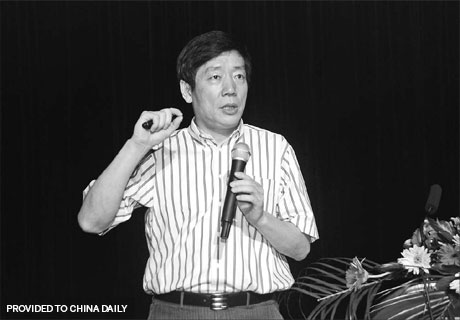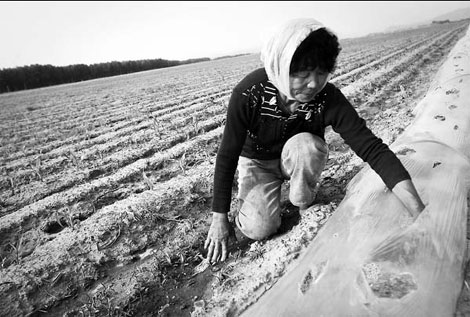'Golden fingers' cultivate his career
|
A farmer tends to her crops in Hunchun, Jilin province. Nelson Ching / Bloomberg |
Seed expert pioneers new technique in Chinese farming
BEIJING - In China's seed industry, Liu Shi is known for his "golden fingers". For nine years he worked in the top position at Monsanto Far East Ltd, the company's China division, where its cotton seeds laid claim to 95 percent of China's market share at the time.
Liu then spent eight years at Pioneer Hi-Bred International Inc, a subsidiary of DuPont de Nemours, during which time the company's corn seeds were sown in more than 2 million hectares of the country's corn fields.
In 2010, he joined Yuan Long Ping High-Tech Agriculture Co Ltd, one of China's major players in the agriculture sector. Within one year, the company's net profit was doubled.
Besides "good luck", Liu attributes his successes to his perseverance and natural instinct for adventures. After graduating from university, he traveled 2,000 kilometers alone on a bicycle from Beijing to Shanghai.
The same adventurous spirit prompted him to jump on a train to Germany in 1987 with only 800 yuan ($125) in his pocket. He could not afford a return ticket.
The train journey took eight days and nights. It was as stuffy as a prison. But he knew, when the doors finally opened, there was a whole new world outside.
Liu's principal reason for going to Germany was to study law, but in so doing he acquired discipline. "Punctuality and exactitude - these are what I learnt from the German people. It exerted a powerful influence on my character," Liu said.
Five years later, in 1992, Liu gave up his studies and joined Monsanto. He opened the door for the company to China's market, and the company ushered him into a new industry.
Tough initiation

It was a tough initiation. All Liu had was an empty title, one secretary in Hong Kong and one temporary technician on the mainland. He started selling agricultural chemicals and soon his extraordinary abilities were rewarded.
Through relentless negotiation, he first obtained an import quota by cooperating with State-owned companies. He then built up a chain of warehouses and packaging centers in Hong Kong, Guangzhou and Shanghai, which reduced the time needed for transportation and distribution. Within four years, sales of Monsanto's chemicals had registered a steep increase.
But this was not enough. Since 1993, China's cotton production had been affected by worm plagues every year. Hundreds of farmers were poisoned every year in their own cotton fields, fighting against the worms with heavy use of chemicals.
During these years, Liu introduced Monsanto's genetically modified (GM) insect-resistant cotton seeds to China and set up two joint ventures with Chinese partners to produce the seeds for the local market.
Monsanto's cotton seeds soon became a market success. The move was regarded by many as the savior of China's textile industry. So far, cotton is the only GM crop that has been authorized for large-scale planting in China.
"One thing I learned during the years at Monsanto is to be creative. The company has a great culture for encouraging people to develop their creativity. I had plenty of good ideas at Monsanto and I managed to make some of them possible," Liu said.
"The supply chain and the distribution channels - it may have seemed too fantastical to realize them at the time, but I believe there is always a way, and I succeeded," he added.
In its heyday, Monsanto's cotton seeds had 95 percent of China's market share. At the same time, the US-based company was going through a deep restructuring of its business.
'Idealist'
Instead of laying low and waiting for the winds of change to blow over, the urge for adventure once again drove him forward. This time, he told himself, he wanted something more serious and "real". In 2001, Liu joined Pioneer.
"Liu Shi calls himself an 'idealist', but he has a practical side. He knows how to carry out his plans step by step - with extraordinary thoroughness," said Hardeep Grewal, who was Liu's supervisor at Pioneer.
Liu said: "Pioneer has a different corporate culture from Monsanto. It has a clear market positioning for its products and a profound understanding of the seed industry."
Liu's first big movement after joining Pioneer was to promote the so-called "single-seed planting technique". Traditionally, farmers in China put half a dozen corn seeds in each drill hole to ensure at least one of them sprouts. What Liu wanted to promote was the technology that enables farmers to sow a single seed in each hole, with a successful germination rate of more than 95 percent.
This single-seed planting technology can save farmers' seeds and the time and effort required to remove competing seedlings from the same hole, a labor-intensive task which is usually performed under the scorching summer sun.
"I borrowed many ideas from the mass consumption industry. You have to think about the consumers'/end-users' problems and needs. And you have to provide them with a solution and service rather than a product," Liu said.
The single-seed planting technique was only part of his famous business model. To further free the farmers from back-breaking field labor, Liu decided to promote mechanized seed drills.
Unlike other countries with an advanced agricultural sector, Chinese farmers are mostly smallholding peasants. In China, on average, farmers have less than one hectare. As such, it does not make economic sense to employ the large machines used in other countries.
Liu was once again driven forward by his perseverance. "I believe anything is possible, so long as I set my mind to do it," he said.
At that time, single-seed planting was still a novelty for Chinese agricultural machinery companies. It took Liu one year to go through the country's agricultural machinery companies one by one and finally find one that could and would like to cooperate with him.
From then on, every spring, Pioneer would instruct local distributors to organize a team of farmers to help sow seeds with the mechanized seed drills. In Shitie county, in central China's Shanxi province, the team charges 300 yuan to sow a hectare with corn. In good years, each hectare can yield crops worth 30,000 yuan.
"These technologies improve efficiency and make the work of planting easier. To the farmers, they are revolutionary," said Wei Yuejin, a local agricultural officer.
Liu said: "You first have to create value for the farmers. Then you will be rewarded by the market." Once again, his golden fingers took a firm grip on the market's demand curve. In the following years, sales of Pioneer's seeds soared.
Storm's eye
The rapid expansion of Pioneer's market share has alarmed some Chinese observers. Some of them fear Chinese farmers might become too dependent on seeds from foreign companies. Others warned against the scenario of China's agricultural sector being controlled by big multinationals.
Standing in the storm's eye, Liu was an easy target. "You are a guilty person in China's history because you promoted Pioneer's seeds," said one comment on Liu's blog, made eight months after he left Pioneer.
But to Liu, the introduction of foreign seeds could facilitate the development of China's seed industry.
"China lags behind in technology and research capability in the seed industry. The government should promote innovation in the seed industry under the current administrative structure. We need to change and learn from multinationals," he said.
It was not the provenance of the seeds that prompted Liu to leave Pioneer. After so many years, he said he felt he had gone as far as he could. It was as though a "glass-ceiling" was pressing against his head. It is hard to break through. Liu said with a gentle sigh.
"Long Ping High-Tech is a different platform. It is a Chinese company and it allows me more freedom," he added. "A good seed can adapt to different environments. So can I."
China Daily

(China Daily 10/27/2011 page14)















